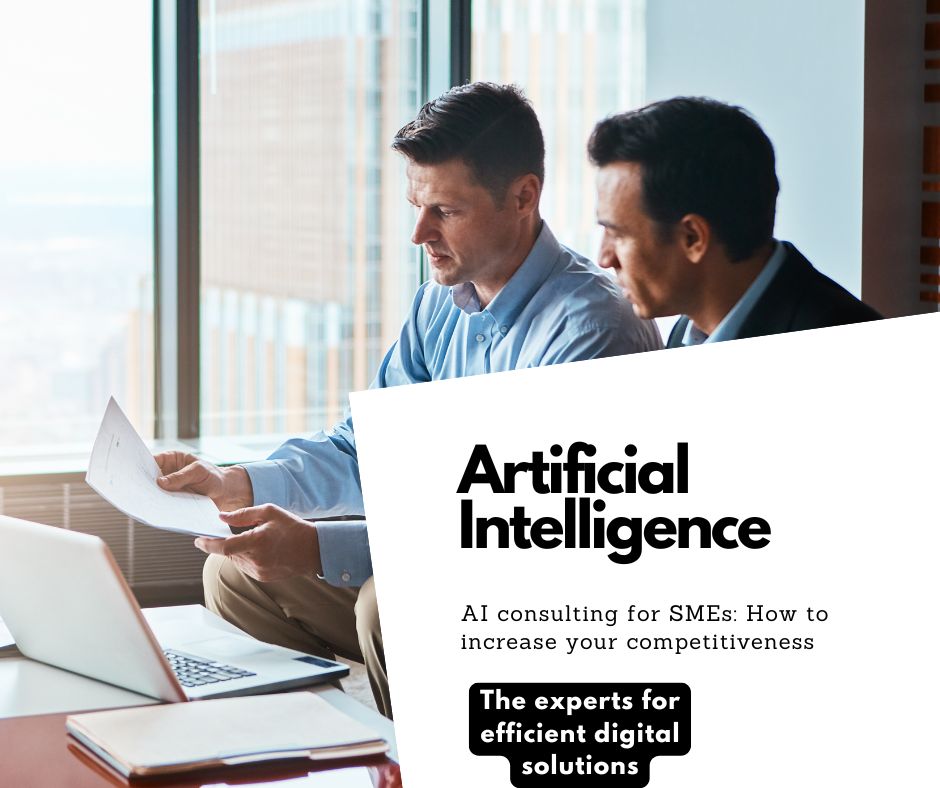Competitive with AI: Advice for SMEs

Medium-sized companies face the challenge of keeping pace with large companies and innovative start-ups. Artificial intelligence (AI) can prove to be a decisive factor in remaining competitive and optimizing business processes. AI consulting offers valuable support by helping companies to recognize and successfully exploit the potential of AI technologies.
Through customized AI solutions, SMEs can increase efficiency, improve customer experience and make data-driven decisions. In this article, we look at how a professional AI consultancy can help SMEs not only survive in the digital age, but also actively develop new business opportunities. Together, we look at the benefits, typical application areas and the specific services DMG offers in this area. Discover how you can increase your competitiveness with AI!
Advantages of AI consulting for SMEs
The implementation of artificial intelligence (AI) offers SMEs numerous advantages that not only increase their efficiency, but also improve their competitiveness in a dynamic market. Here are some of the specific benefits offered by professional AI consulting:
The benefits of professional AI consulting for SMEs are immense. Not only does it increase efficiency and reduce costs, but it also improves the customer experience and gives companies a better competitive position in the market. At a time when digital transformation is essential, AI consulting provides the necessary framework for SMEs to be successful.


Typical areas of application for AI in SMEs
The integration of artificial intelligence (AI) in SMEs opens up numerous opportunities for optimizing processes and improving competitiveness. Here are some of the typical areas of application in which AI can be used effectively:
Customer service and support
AI technologies, especially chatbots and virtual assistants, are revolutionizing customer service. They offer round-the-clock support and can respond immediately to frequent inquiries. This significantly reduces waiting times for customers and allows human employees to focus on more complex issues. Examples of the use of AI in customer service include
Automation of business processes
AI can automate repetitive and time-consuming tasks, significantly increasing the efficiency of business processes. Examples include
Marketing
In the marketing sector, AI-supported analyses provide a deeper insight into customer behavior. Companies can create targeted campaigns and adapt their marketing strategies accordingly. Application examples include:
Product development
In product development, AI-supported systems can help to conduct market research and develop innovative products. AI algorithms analyze trends and customer feedback to generate new product ideas. Examples:
Personnel management
AI can also be used in HR to optimize processes and increase employee satisfaction. Application examples include:

From idea to implementation: successfully launching AI projects in SMEs
The implementation of AI projects in SMEs can have a transformative effect on a company’s business processes and competitiveness. To ensure the transition from idea to successful implementation, there are a few key steps to consider:
Needs analysis and objectives
Before you start implementation, it is crucial to carry out a thorough needs analysis. Think about the specific problems or challenges you want to solve with AI. Define clear goals and measurable outcomes that you want to achieve with the AI project. This could include improving efficiency in a specific business area, increasing customer satisfaction or automating repetitive tasks.
Feasibility study
Conduct a feasibility study to find out which AI technologies and tools are best suited to your project. Consider both the technical aspects and the financial resources. It is important to understand whether your company has the necessary infrastructure and data availability to successfully implement the AI project.
Partner selection and expertise
Choosing the right partner is crucial to the success of your AI project. Consider whether you want to use internal resources or bring in an external service provider like DMG. An experienced partner can not only support the implementation, but also provide valuable advice to ensure your AI strategy and AI projects are heading in the right direction.
Prototyping and iteration
Start by developing a prototype to test and refine your ideas. This allows you to gather feedback and make adjustments early on. An iterative approach helps to identify potential problems early on and ensure that the solution meets your company’s requirements.
Training and integration
Once the AI system has been developed, training your employees is of central importance. Make sure your team understands the new technologies and can use them efficiently. Smooth integration into existing processes is equally important to get the maximum benefit from the AI project.
Monitoring and continuous improvement
After implementation, you should continuously monitor the performance of the AI system. Analyze the results and ensure that the defined goals are being achieved. Use these findings to make continuous improvements and further optimize the AI solution.
The journey from idea to implementation of an AI project requires careful planning, collaboration and adaptability. By taking a structured approach, you can ensure that your company successfully leverages the benefits of artificial intelligence and holds its own against the competition. The right support and expertise are key to successfully launching your AI project in the SME sector.
Measurable success: KPIs and ROI in AI projects
The implementation of AI projects offers SMEs the opportunity to significantly increase their efficiency and competitiveness. In order to measure the success of such initiatives and evaluate the return on investment (ROI), it is crucial to define suitable success indicators and metrics. Here are some important aspects to consider when measuring the success of AI projects:
Key Performance Indicators (KPIs)
KPIs are crucial for evaluating the progress and effectiveness of AI projects. Some relevant KPIs for AI projects in SMEs could be:
Key financial figures
The financial impact of AI projects should also be closely monitored to determine ROI. Here are some examples:
Long-term effects
The ROI assessment should also consider the long-term benefits of AI projects. These can include:
Feedback and customization
It is important to obtain regular feedback from stakeholders and evaluate the results of AI projects. This feedback can help to optimize the implementation and ensure that the set goals are achieved.
Measuring success metrics and analyzing ROI are essential to capturing the value of AI projects for SMEs. By properly defining and monitoring these metrics, companies can make informed decisions, continuously adjust their AI strategies and ensure they are achieving the desired results. A systematic approach to measuring success will ultimately help to sustainably increase competitiveness in the digital age.


Case study 1: New products with AI
In an exciting project, DMG helped a medium-sized shipyard to significantly enhance its existing products by integrating artificial intelligence. The shipyard, which specializes in the construction of yachts, wanted to offer its customers innovative functions that would increase the utility value of their products.
Background:
The shipyard was faced with the challenge of developing new sales arguments in a highly competitive market in order to set itself apart from other providers. The desire was expressed to integrate AI functions that would help customers to better use and control their yachts.
Solution:
DMG carried out a detailed analysis of the existing products and customer needs and developed a concept for integrating AI-supported functions. These included intelligent control systems that enable users to operate their yachts by voice command, as well as predictive maintenance functions that monitor the condition of the yachts and provide proactive maintenance advice.
Result:
The introduction of the AI functions led to a significant increase in sales figures and improved customer satisfaction. The shipyard was able to position itself as an innovation leader in yacht building and gained numerous new customers who appreciated the modern functions.
Case study 2: Increasing efficiency through automation
In another project, DMG helped a medium-sized company from the logistics sector to increase the efficiency of its operational processes by using AI-supported automation.
Background:
The company was faced with high operating costs and inefficient workflows. Manual processes often led to delays and increased error rates, which had a negative impact on customer satisfaction.
Solution:
DMG analyzed the existing processes and identified several areas where AI-supported automation could bring significant improvement. The implementation of an AI system to automate order processing and tracking was initiated. By using machine learning algorithms, the system was able to analyze and prioritize orders in real time, which significantly reduced processing time.
Result:
The automation led to a considerable reduction in processing times and the error rate. Within six months, the company was able to increase its efficiency by 30% and significantly improve customer satisfaction. The savings in operating costs enabled the company to invest in additional technologies and secure its long-term competitiveness.


In today’s digital era, artificial intelligence is not just a technological trend, but an essential component of corporate strategy for SMEs. AI consulting gives SMEs the opportunity to work more efficiently, optimize their processes and ultimately increase their competitiveness. At DMG, we are committed to ensuring that our customers can exploit the full potential of AI and thus successfully master the challenges of the future.
Till Neitzke
Effective AI strategies for SMEs: DMG services
At DMG, we offer a comprehensive range of AI & Data consulting services specifically geared towards the needs of SMEs. Our AI consulting services are designed to help SMEs enter the world of artificial intelligence and maximize their competitiveness. With a combination of strategic planning, technical expertise and hands-on training, we help you to reap the benefits of AI in the long term.
Needs analysis and strategy development
We start with a detailed needs analysis to understand the specific requirements of your business. Based on this, we develop a customized AI strategy that is aligned with your business goals and identifies the best opportunities to increase efficiency.
Implementation of AI solutions
Our team of experts supports you in the implementation of AI technologies. We help you select the right tools and platforms and carry out the integration into existing systems. Our technical expertise ensures smooth implementation and customization.

Training courses and workshops
To ensure that your team can use the new technologies effectively, we offer comprehensive training courses and workshops. These events are designed to train employees in the basics of AI and provide them with the knowledge they need to use AI applications successfully in their day-to-day work.
Specialized advice on AI applications
We can also advise you on specific AI applications that are tailored to the needs of your industry. Whether it’s automating processes, optimizing customer service or implementing data-driven decisions, we’ll help you find the right solutions.
Conclusion: AI consulting for SMEs
The integration of artificial intelligence (AI) in SMEs is not just an option, but a decisive step towards ensuring competitiveness in an increasingly digital world. Professional AI consulting offers SMEs the support they need to successfully exploit the potential of AI technologies.
By identifying specific needs and developing tailored strategies, companies can increase their efficiency, improve the customer experience and make data-driven decisions. The real-life examples show that the use of AI not only optimizes internal processes, but can also revolutionize customer contact and market understanding.
With our comprehensive services, from needs analysis to implementation and continuous optimization, we at DMG are ready to accompany you on this exciting journey. Let’s discover the benefits of AI for your business together and set the course for a successful future. At a time when innovation is the key to success, now is the right time to invest in AI consulting.

Successful together in the digital transformation –
Your introductory meeting with DMG
In our introductory meeting we will discuss
- what your current challenges are in digital projects
- how other companies have done it and how you can use this to your advantage.
- what needs to be done now and whether we are the right people for the job.
